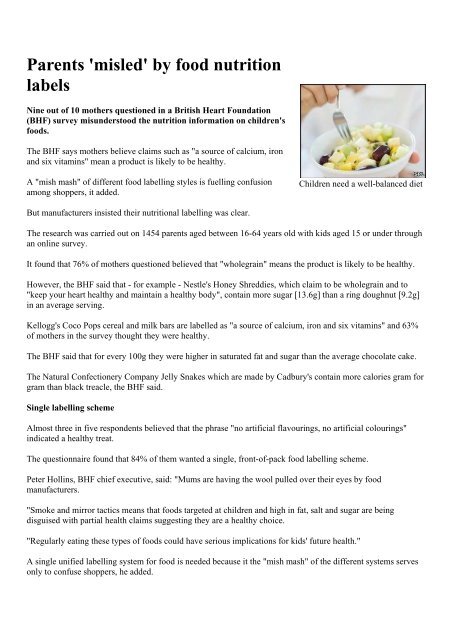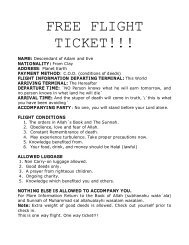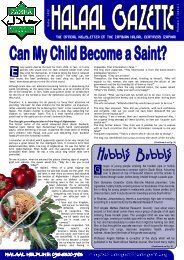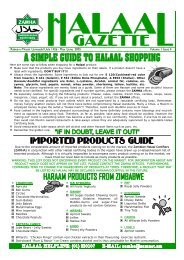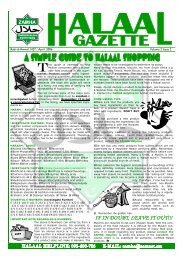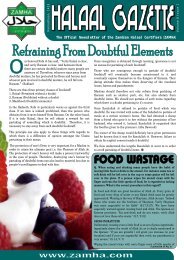Parents 'misled' by food nutrition labels
Parents 'misled' by food nutrition labels
Parents 'misled' by food nutrition labels
Create successful ePaper yourself
Turn your PDF publications into a flip-book with our unique Google optimized e-Paper software.
<strong>Parents</strong> <strong>'misled'</strong> <strong>by</strong> <strong>food</strong> <strong>nutrition</strong><strong>labels</strong>Nine out of 10 mothers questioned in a British Heart Foundation(BHF) survey misunderstood the <strong>nutrition</strong> information on children's<strong>food</strong>s.The BHF says mothers believe claims such as "a source of calcium, ironand six vitamins" mean a product is likely to be healthy.A "mish mash" of different <strong>food</strong> labelling styles is fuelling confusionamong shoppers, it added.Children need a well-balanced dietBut manufacturers insisted their <strong>nutrition</strong>al labelling was clear.The research was carried out on 1454 parents aged between 16-64 years old with kids aged 15 or under throughan online survey.It found that 76% of mothers questioned believed that "wholegrain" means the product is likely to be healthy.However, the BHF said that - for example - Nestle's Honey Shreddies, which claim to be wholegrain and to"keep your heart healthy and maintain a healthy body", contain more sugar [13.6g] than a ring doughnut [9.2g]in an average serving.Kellogg's Coco Pops cereal and milk bars are labelled as "a source of calcium, iron and six vitamins" and 63%of mothers in the survey thought they were healthy.The BHF said that for every 100g they were higher in saturated fat and sugar than the average chocolate cake.The Natural Confectionery Company Jelly Snakes which are made <strong>by</strong> Cadbury's contain more calories gram forgram than black treacle, the BHF said.Single labelling schemeAlmost three in five respondents believed that the phrase "no artificial flavourings, no artificial colourings"indicated a healthy treat.The questionnaire found that 84% of them wanted a single, front-of-pack <strong>food</strong> labelling scheme.Peter Hollins, BHF chief executive, said: "Mums are having the wool pulled over their eyes <strong>by</strong> <strong>food</strong>manufacturers."Smoke and mirror tactics means that <strong>food</strong>s targeted at children and high in fat, salt and sugar are beingdisguised with partial health claims suggesting they are a healthy choice."Regularly eating these types of <strong>food</strong>s could have serious implications for kids' future health."A single unified labelling system for <strong>food</strong> is needed because it the "mish mash" of the different systems servesonly to confuse shoppers, he added.
"It's time for <strong>food</strong> companies to stop making excuses, support one system and ensure shoppers are given 'at aglance' information about the <strong>food</strong>s they're giving their kids."A spokesman for the Natural Confectionery Company said: "All we claim is that the sweets contain no artificialcolours and flavours - which is true - so we're not sure why this should confuse anybody."All <strong>nutrition</strong>al information is clearly labelled on the bag."And a spokesman for Kellogg's responded: "A Kellogg's Coco Pops Cereal and Milk bar actually contains lessthan two teaspoons of sugar per bar and has half the calories (84) and far less fat than a chocolate bar."<strong>Parents</strong> understand this because we give them the information they need, through our front-of-pack labelling,to make similar comparisons."Julian Hunt, of the Food and Drink Federation, has complained that the BHF did not share its research withthem: "The truth is that the <strong>food</strong> industry takes its responsibilities seriously."That's why our members are leading the world when it comes to ensuring that <strong>food</strong> recipes meet the demandsof mums and their families - whether that's through the use of natural ingredients; reducing the amount of salt,fat or sugar used; or fortifying products with <strong>nutrition</strong>ally-vital vitamins, minerals and micro-nutrients."The <strong>nutrition</strong> claims identified <strong>by</strong> BHF are not 'partial health claims' - they are approved under the EUNutrition and Health Claims Regulation, which is setting a strict legal framework for all claims on <strong>food</strong> packs."To claim otherwise is being completely disingenuous - or shows that the BHF is deliberately trying to misleadboth mums and journalists at what is a very busy time for all of us."Source: BBC News


